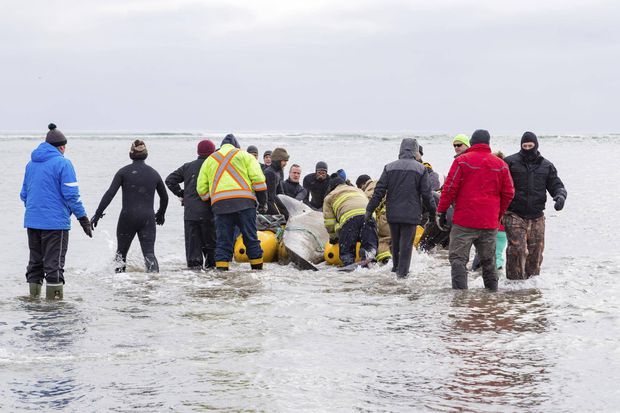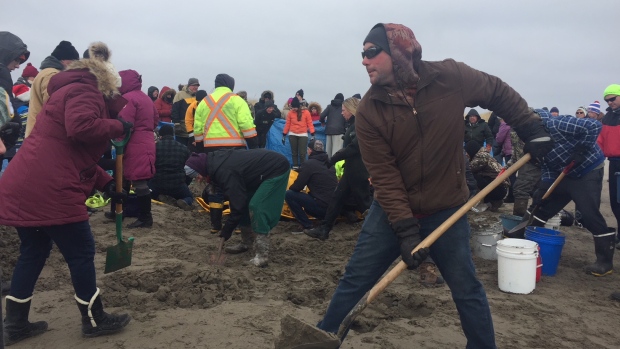“There was this massive movement of people who converged on the beach during winter. That was the awesome part…a real organic, selfless movement of people.” – Trevor Kennedy, local photographer.

PHOTO: The Globe and Mail
NOVA SCOTIA, CANADA – At Rainbow Haven Beach, just east of Halifax, one person discovered a pilot whale had run aground overnight. If something wasn’t done about it soon, it would die on the beach.
The beachgoer took to Facebook to spread the news. Soon, pictures of the beached whale were paired with praying hand emojis and appeals for help on smartphones everywhere, and over 100 local Nova Scotians appeared on the beach with shovels and blankets to do all they could to help.
It was an icy-cold day, hovering at a chilling 14 degrees Fahrenheit. Still, the impromptu rescue team was undaunted by the cold and wet. Some were police, some were firefighters, some were surfers…but most of them were just ordinary Nova Scotian residents who were choosing to spend their New Years Day using “people power” to pull the beached whale back to sea, saving it from death with their bare hands.
Among the group was Andrew Reid, a response coordinator for Halifax-based Marine Animal Response Society (MARS). He coached the crowd in how to help the pilot whale. According to him, rescues like this are rare. Whales can weigh around 4400 pounds. This one was no exception. Before long, people started to wonder if they ought to get a four-wheeler, boat, or construction machine to help drag the mammal back to sea.
But, as more and more people joined the effort, it soon became apparent they wouldn’t need a machine. They had enough people to do the job themselves.
“We were discussing our options – were we waiting for the tide? Or trying to get an excavator down there?” Mr. Reid said.
“… But within probably half an hour or 40 minutes, we had 100 people there. We potentially could have made it comfortable and waited for the tide, but we had the people power, and didn’t have to wait.”

PHOTO: CBC.ca
Time was of the essence. The whale risked frostbite and freezing if it stayed in the cold air for much longer – especially in its fins and tail. Its organs were slowly being crushed by its own weight. If it remained stuck for too long, the trauma would eventually become too much to bear.
By noon, the volunteers were shoveling a path back to the sea. More rescuers brought in an inflatable raft and placed it under the whale. Then, a few dozen more people yanked the raft from the beach back out to sea. As the water got deeper, half a dozen surfers who had arrived in their wetsuits helped the whale navigate past the sandbars that had originally trapped it on the beach at the low tide.
At last, the whale was free.
It’s unclear how the whale became so lost in the first place. According to Mr. Reid, Pilot whales travel in family groups, so it’s not clear why one was found alone on a beach. The hope is that it’ll be able to find its way back home. Now, thanks to a group of strangers who braved the cold to save its life, it at least has a chance.
